Belgium is a country known for being a cultural and linguistic mosaic; diversity is one of the main components of our society, yet it is not always reflected in the workplace, as the report ‘Untapping the True Potential of Belgian Workforce Diversity’ by BCG highlights. The report points out that only 50 percent of employees indicate that their company has DEI programs implemented, and less than one third of the targeted employees have benefited from such programs, suggesting that the measures taken so far are insufficient.
This is an issue that one Belgium’s 40 under 40 Field Work group of Cohort 2021 Spring decided to work on. They founded Cohesion Belgium: an index to improve diversity, equity, and inclusion in companies. The initiative supports building an inclusive workplace where each employee feels valued and given equal opportunities, helping not only the employee, but also the company to be more profitable and innovative. The origin of Cohesion Belgium can be traced back to the first 40u40 Forum of the first Cohort, when the Fellows met and formed a Field Work group. Within the following year, a strong team was built, the idea of Cohesion Belgium was born, and the initiative was first launched successfully with Luminus.
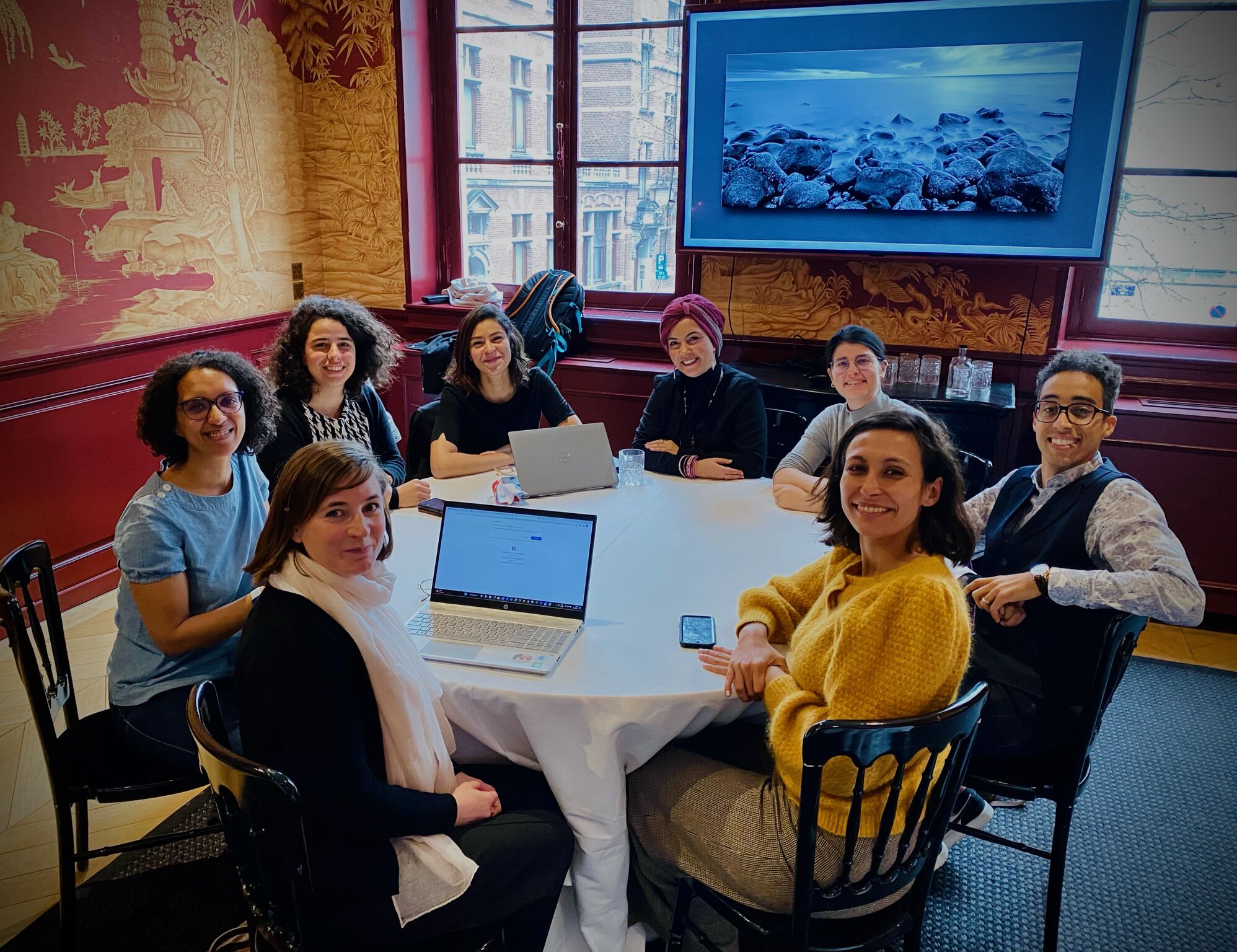
The first Forum of Cohort 2021 Spring gathered forty talented young leaders under forty, who entered into a journey of professional and personal development, centered around leadership and societal impact. Among them were Steve Ahouanmenou, Danaé Coquelet, Fatima Zibouh, Mouna Dourasse, Jean-Marc Duyckaerts, Emmanuelle Ghislain, Céline Naveau, Nadine Khouzam and Magali Bodeux, the Field Work group who created Cohesion Belgium. “At the first Forum, we all had to write down one sentence that summarizes what we believe in and what we strive for. Based on this, we formed groups, and we found each other under the inclusion aspect”, Nadine recalls.
Magali explains, “we all feel part of ‘diversity groups’, it is an issue close to our hearts. We all see and feel that there is something to improve. In our careers, we have all seen and experienced first hand that there is room to improve diversity, inclusion and equity in companies today. As we have succeeded in our careers and are in a position of influence, we want to use our strengths to tackle the problem and bring a solution.” It was a diverse group, mixed with people coming from different backgrounds and jobs. Nadine remembers “we had someone who was in politics, someone who was in recruiting, or the data side.” The goal of this exercise was to form teams for the Field Work projects: a platform for increasing the positive impact of the Fellows, using collective intelligence and collaborative creation of tangible actions. It is a sandbox to try out new ideas to improve society.
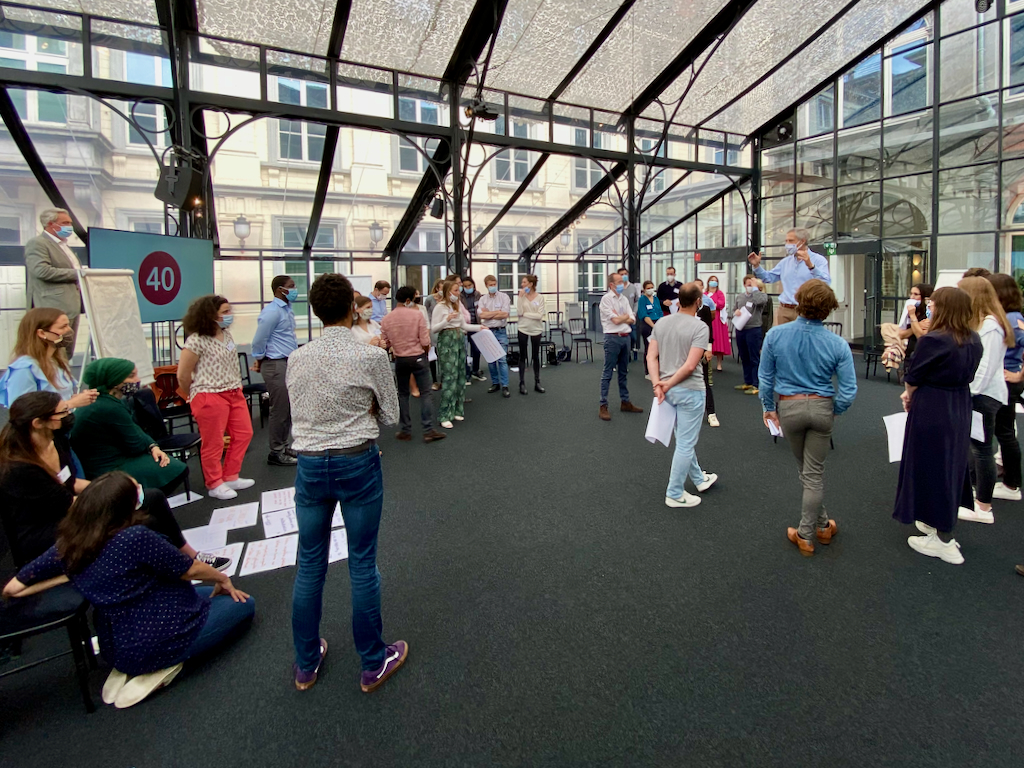
The group was formed, but the foundation of Cohesion Belgium was still a few steps away. The first focus of the Fellows was to get to know one another, to build a strong team and find out what they want to do together. Nadine shares how “in the beginning, we really worked on finding our strengths and asking questions such as what do we want to achieve, what do we care about?” It was a time of reflections and connections, as Magali recalls the first six months of the Field Work project: “We had a lot of deep discussions and we got to know each other. We had one session with a coach to define a more structured format and to break down where we want to go. We also went several times to a restaurant together; we brought a flip chart and post-its and put all our ideas together. We had some meetings like these to decide what our project could be, it took us a while to get there, but it was a time well spent.” This approach formed a strong team where every member felt welcome and close to each other, making their meetups feel like a reunion of friends.
The Field Work project was also a challenging part of the 40u40 program. “It was a bit chaotic, we had to define what and how to work. It was also a bit disorienting at first because we come from different career backgrounds”, Nadine shares about their experience with the Field Work project. Magali also describes the beginning as a challenge, she values how the group “had support from the 40u40 team in terms of discussing our ideas and getting feedback, it was very helpful then and it continues being an asset until today for Cohesion Belgium.” In addition, the Field Work project was an opportunity for some members of the group to learn more about DEI itself, others learned about what it takes to launch a new project, and how to work together as a big group. “Working together as a group of 10 people with diverse perspectives showed us that it might be slower than going alone, but the experience is richer, and it helps us go further,” Magali shares about her learnings.
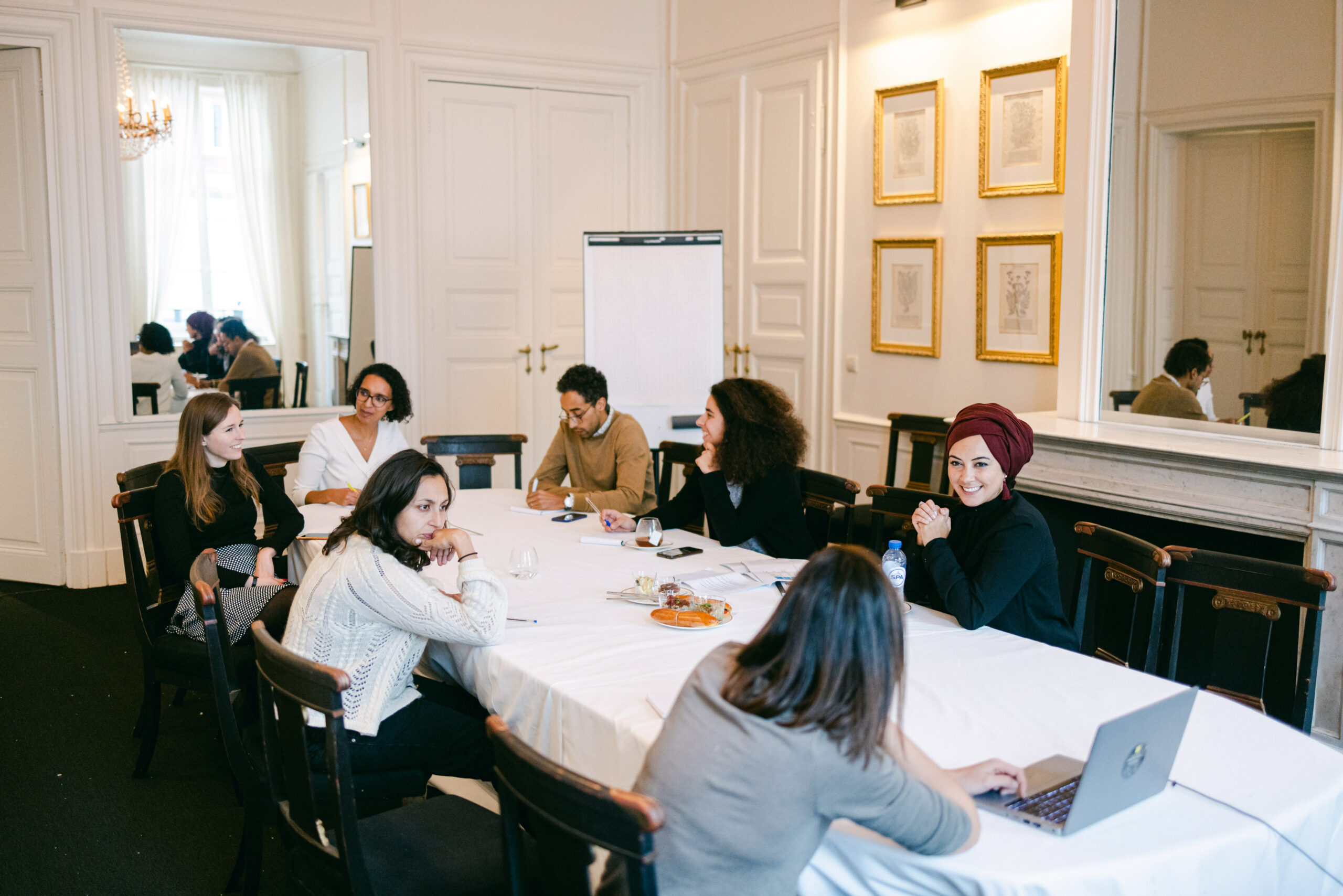
The societal issue the Field Work group decided to tackle was “the problem that DEI is not measured systematically across companies, and if you cannot measure, you cannot improve. Many companies have no way of judging whether they are inclusive, they feel like they are, but it is only once you start breaking it down and take a deeper look at the inclusion feeling of, for example disabled people or the LGBTQIA+ community, you get clear insights,” Nadine explains. Eventually, the idea of creating Cohesion Belgium was born: An organization to deploy an inclusion index to remedy the lack of data available in companies when taking actions on DEI and offer improvement suggestions. The goal is to enable companies to understand how their employees feel acknowledged as adding value with their differences, where to prioritize their actions and quantify their impact. Cohesion Belgium focuses on three main aspects: The DEI Index includes a survey and a dashboard that companies can roll out internally to measure their progress in terms of diversity, equity and inclusion. “We send a survey to all employees of a company, and based on the results we build insights and analytics around measuring the diversity, equity and inclusion feeling in five categories: age, gender, ethnicity, disabilities and LGBTQIA+,” Nadine explains. Another aspect is the building of a community and the organization of semi-annual workshops with HR Directors or DEI leaders to discuss and exchange on this topic. Finally, Cohesion Belgium offers a DEI expertise, aiming to put companies in touch with DEI experts in Belgium for the implementation of concrete actions.
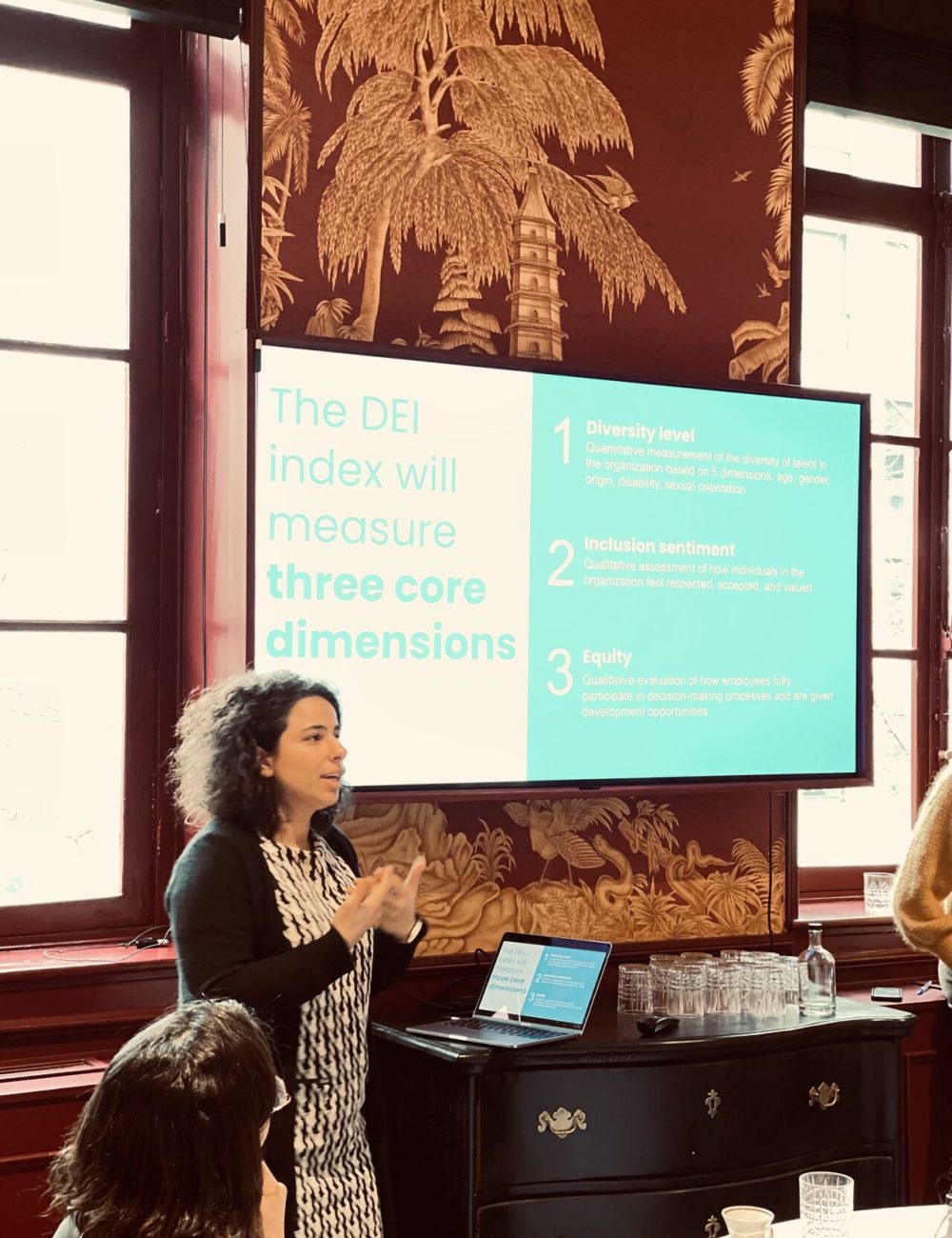
“I first touched points with Cohesion Belgium thanks to my 40u40 Mentee Magali Bodeux, it was her Field Work group that developed the inclusion index. As a company that values diversity and inclusion, we were happy to be part of the pilot of Cohesion Belgium and learn more about how we can improve in that area at Luminus. We first conducted the survey to measure where we are doing well, and where there is improvement needed for inclusion. The results were discussed with my team, as well as at a workshop with DEI leaders from other industries, which gave us new insights and strategies for improvement. For example, we confirmed that the inclusion feeling is good in the company, but the survey helped us measure disparities between the sites or across departments, which is a new insight for us and pointed to specific actions to start or reinforce. The DEI expertise Cohesion Belgium offers also proved to be a helpful tool to enhance our efforts, and we implemented several new ideas at Luminus. I’m delighted with the outcome of the pilot, we found out where change is needed and it’s important to always learn and improve. In addition, the energy and the enthusiasm of the Cohesion Belgium team was contagious, they did a great job putting the index together and our discussions are very enriching.”
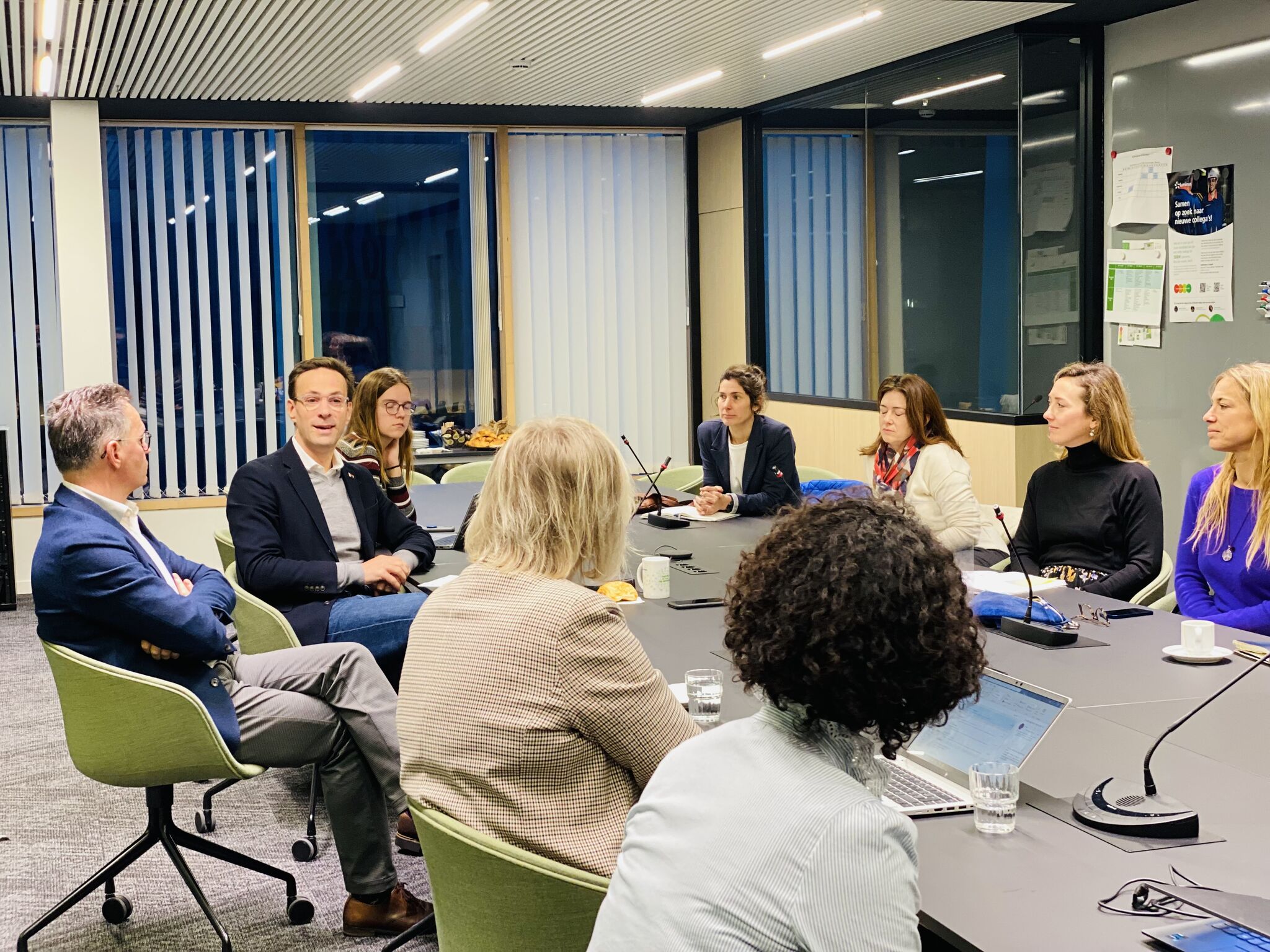
| Cookie | Duration | Description |
|---|---|---|
| cookielawinfo-checkbox-advertisement | 1 year | Set by the GDPR Cookie Consent plugin, this cookie is used to record the user consent for the cookies in the "Advertisement" category . |
| cookielawinfo-checkbox-analytics | 1 year | Set by the GDPR Cookie Consent plugin, this cookie is used to record the user consent for the cookies in the "Analytics" category . |
| cookielawinfo-checkbox-functional | 1 year | The cookie is set by the GDPR Cookie Consent plugin to record the user consent for the cookies in the category "Functional". |
| cookielawinfo-checkbox-necessary | 1 year | Set by the GDPR Cookie Consent plugin, this cookie is used to record the user consent for the cookies in the "Necessary" category . |
| cookielawinfo-checkbox-others | 1 year | Set by the GDPR Cookie Consent plugin, this cookie is used to store the user consent for cookies in the category "Others". |
| cookielawinfo-checkbox-performance | 1 year | Set by the GDPR Cookie Consent plugin, this cookie is used to store the user consent for cookies in the category "Performance". |
| CookieLawInfoConsent | 1 year | Records the default button state of the corresponding category & the status of CCPA. It works only in coordination with the primary cookie. |
| elementor | never | This cookie is used by the website's WordPress theme. It allows the website owner to implement or change the website's content in real-time. |
| JSESSIONID | session | New Relic uses this cookie to store a session identifier so that New Relic can monitor session counts for an application. |
| wpEmojiSettingsSupports | session | WordPress sets this cookie when a user interacts with emojis on a WordPress site. It helps determine if the user's browser can display emojis properly. |
| Cookie | Duration | Description |
|---|---|---|
| lang | session | LinkedIn sets this cookie to remember a user's language setting. |
| li_gc | 5 months 27 days | Linkedin set this cookie for storing visitor's consent regarding using cookies for non-essential purposes. |
| lidc | 1 day | LinkedIn sets the lidc cookie to facilitate data center selection. |
| Cookie | Duration | Description |
|---|---|---|
| _ga | 1 year 1 month 4 days | Google Analytics sets this cookie to calculate visitor, session and campaign data and track site usage for the site's analytics report. The cookie stores information anonymously and assigns a randomly generated number to recognise unique visitors. |
| _ga_* | 1 year 1 month 4 days | Google Analytics sets this cookie to store and count page views. |
| _gat_gtag_UA_* | 1 minute | Google Analytics sets this cookie to store a unique user ID. |
| _gcl_au | 3 months | Google Tag Manager sets the cookie to experiment advertisement efficiency of websites using their services. |
| _gid | 1 day | Google Analytics sets this cookie to store information on how visitors use a website while also creating an analytics report of the website's performance. Some of the collected data includes the number of visitors, their source, and the pages they visit anonymously. |
| CONSENT | 2 years | YouTube sets this cookie via embedded YouTube videos and registers anonymous statistical data. |
| Cookie | Duration | Description |
|---|---|---|
| li_alerts | 1 year | Description is currently not available. |
| Cookie | Duration | Description |
|---|---|---|
| bcookie | 1 year | LinkedIn sets this cookie from LinkedIn share buttons and ad tags to recognize browser IDs. |
| bscookie | 1 year | LinkedIn sets this cookie to store performed actions on the website. |
| IDE | 1 year 24 days | Google DoubleClick IDE cookies store information about how the user uses the website to present them with relevant ads according to the user profile. |
| test_cookie | 15 minutes | doubleclick.net sets this cookie to determine if the user's browser supports cookies. |
| VISITOR_INFO1_LIVE | 5 months 27 days | YouTube sets this cookie to measure bandwidth, determining whether the user gets the new or old player interface. |
| VISITOR_PRIVACY_METADATA | 6 months | YouTube sets this cookie to store the user's cookie consent state for the current domain. |
| YSC | session | Youtube sets this cookie to track the views of embedded videos on Youtube pages. |
| yt-remote-connected-devices | never | YouTube sets this cookie to store the user's video preferences using embedded YouTube videos. |
| yt-remote-device-id | never | YouTube sets this cookie to store the user's video preferences using embedded YouTube videos. |
| yt.innertube::nextId | never | YouTube sets this cookie to register a unique ID to store data on what videos from YouTube the user has seen. |
| yt.innertube::requests | never | YouTube sets this cookie to register a unique ID to store data on what videos from YouTube the user has seen. |